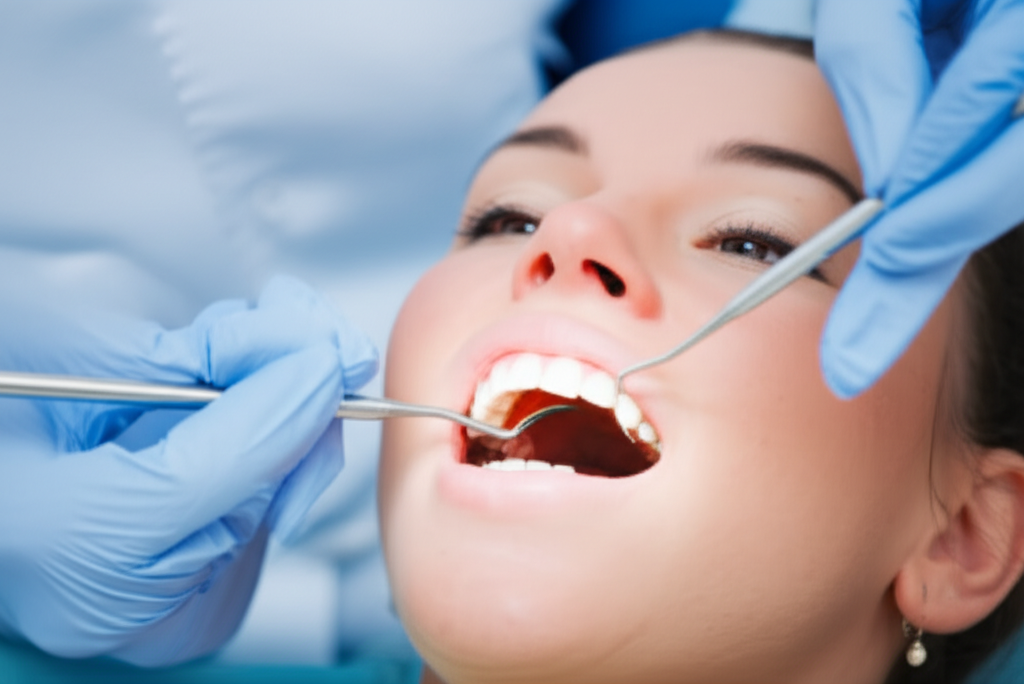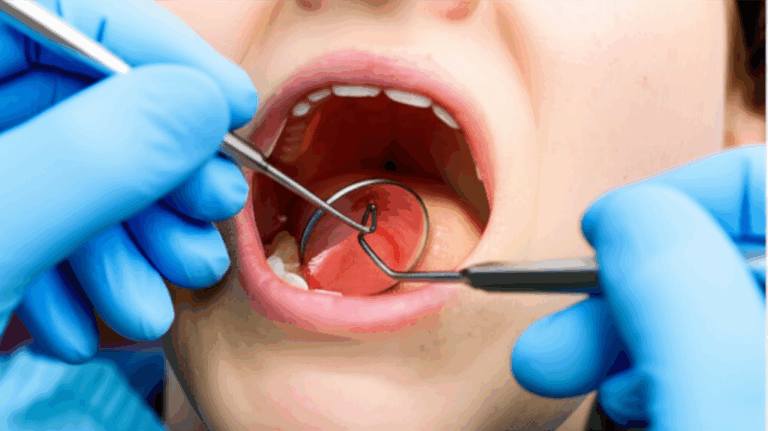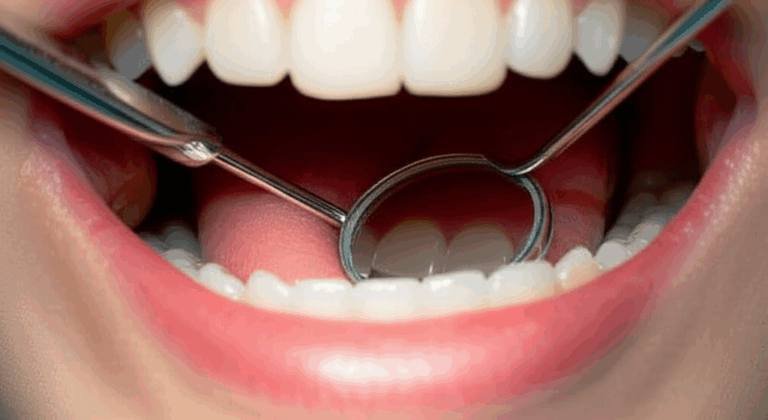
What Do General Dentists Do?
Your Compassionate Guide to Everyday Oral Health
That yearly trip to the dentist—bright lights, that funny bib, and a bunch of tools—might leave you wondering: What does a general dentist do, really? Is it just about cleaning teeth and telling you to floss more, or is there a lot more going on?
Maybe you’re a parent wanting to know how to look after your kid’s teeth. Maybe your gums bleed sometimes and you’re not sure if that’s normal. Or you’ve just moved and need a dentist you can trust for years.
No matter where you are with your smile, you probably have questions. So let’s make it simple and talk about what these dentists actually do, and how they help keep you and your family healthy and comfortable.
In This Article
- The General Dentist: Your Main Helper with Teeth
- Core Jobs: Prevent, Find, Fix, and Make Better
- More Than Just the Basics: Other Things a General Dentist Can Do
- When and Why to See Your Dentist
- General vs. Specialist: What’s the Difference?
- What Makes Someone a General Dentist?
- Meet the People Helping You at the Dentist’s Office
- Your Smile for Life: Bringing It All Together
The General Dentist: Your Main Helper with Teeth
Think of your general dentist like the team leader for your teeth. They help plan your care, try to notice problems before they get big, and are the first person you see for most tooth troubles.
Why are general dentists so important? Well, just like you have a family doctor, the general dentist is usually your “family dentist.” They see everyone—kids, adults, grandparents—and handle everything from cleanings to toothaches to weird jaw pain. They know how to spot problems, fix teeth, and help you stay healthy. Only when something is really special (like braces, surgery, or very serious gum problems) will you need another kind of dentist.
Did you know about 91% of all dental work is done by general dentists? That’s a lot!
Why Go for Regular Dental Visits?
You’ve probably heard, “Go to the dentist twice a year!” But why? Those checkups do much more than just keep your teeth looking nice. Your dentist can:
- Find cavities before they hurt
- Stop gum disease from sneaking up on you
- Notice mouth cancer or other health problems early
- Save you pain, time, and money by fixing small problems before they get big
Think of your mouth as the front door to your whole health, and dental visits are your regular check-ups that help you stay well.
Core Jobs: Prevent, Find, Fix, and Make Better
So what actually happens when you see a general dentist? Let’s break it down:
1. Diagnosis and Treatment Planning
Full Mouth Exams
When you come in, your dentist looks in your mouth—teeth, gums, tongue, cheeks, sometimes even your jaw. It’s kind of like checking under the hood of your car to make sure everything is alright.
Using X-Rays and Other Tools
Your dentist may use X-rays to look for things you can’t see, like hidden cavities, problems under the gums, or teeth that aren’t coming in right.
A Plan That Fits You
Every person’s mouth is different. Your dentist makes a personal plan—maybe you need a deep cleaning, a filling, some fluoride, or just tips on brushing better.
2. Preventing Problems
This is the main goal—not just fixing teeth, but helping you keep them healthy in the first place.
- Professional Cleanings: The hygienist or dentist removes tough plaque (called tartar) that your toothbrush can’t clean. Think of it as a spa day for your teeth!
- Brushing & Flossing Tips: Having trouble with brushing? Not sure how to floss? They’ll show you the easiest ways—no worries.
- Fluoride and Sealants: For both kids and grownups, fluoride makes teeth stronger, and sealants act like raincoats to keep molars from getting cavities.
- Eating Better for Teeth: Your dentist may talk about foods that are good or bad for your teeth.
- Quick Mouth Cancer Checks: A painless check that could really help if caught early.
3. Fixing Problems: Restoring Teeth
Even people who take care of their teeth get cavities or lose fillings sometimes. General dentists know how to fix these things so you can chew, smile, and talk like normal.
- Fillings: Cavities are cleaned out, then filled in with tooth-colored stuff or silver—quick and easy.
- Crowns and Bridges: If your tooth is too broken for a regular filling, a crown (like a cap) makes it strong again. If you’re missing a tooth, a bridge fills the gap.
- Root Canals: If decay gets deep into the tooth, you might need a root canal. This sounds scary but is usually just like getting a regular filling.
- Simple Tooth Removals: If a tooth can’t be saved, your dentist can take it out in a safe way.
- Dentures (Full and Partial): If you need new teeth, your dentist can make simple and comfy dentures for you.
For some care like making crowns or dentures, your dentist may work with labs like a china dental lab, but your dentist takes care of making sure everything fits just right.
More Than Just the Basics: Other Things a General Dentist Can Do
You might be surprised at what else they handle.
Cosmetic Dentistry (Making Your Smile Look Better)
Want whiter or straighter teeth? General dentists can help:
- Teeth Whitening: They’ll help you pick safe, good ways to whiten your teeth at home or in the office.
- Dental Bonding: If you chip a tooth, they can fix the shape fast.
- Veneers: Thin covers that glue on teeth to hide cracks or stains. For more complex cases, they may work with a veneer lab or send you to a specialist.
Some Orthodontic Help
Some general dentists can give you clear aligners (like Invisalign) for small tooth problems, or they’ll send you to an orthodontist if you need braces.
Gum Health: The Key to Good Teeth
Healthy gums hold your teeth in place.
- Fixing Early Gum Disease: Early problems can often be fixed with cleanings and advice.
- Deep Cleaning: For bad tartar below your gums, they might do a more serious clean (called scaling and root planing).
- Sending You to a Specialist: If the gum problem is more serious, they send you to someone who only does gum care.
Mouthguards and Nightguards
If your child plays sports or you grind your teeth at night, your dentist can make you a custom guard using a dental lab.
Help in Emergencies
Broken tooth? Bad toothache? Lost filling? Your general dentist is the person you call first for quick fixes and pain relief.
When and Why to See Your Dentist
Don’t wait until you’re really hurting to see the dentist. People who come in regularly usually need less work and save money over time.
Regular Visits:
- Most people need a checkup every 6 months, but your dentist might want to see you more or less often.
When to Call the Dentist:
- Tooth pain or jaw pain
- Bleeding or swollen gums
- Bad breath that stays all the time
- Loose adult tooth (this is never normal)
- Teeth that hurt with hot, cold, or sweet things
- Sores in your mouth that won’t heal
What Happens During a Visit?
- They update your health info and ask about any new issues.
- Your teeth get cleaned and checked for tartar and cavities.
- You’ll get a look-over for your whole mouth, face, and neck.
- You might get X-rays if it’s time.
- You’ll get a plan—maybe a pep talk, a filling, a referral, or a simple “See you in six months!”
General vs. Specialist: What’s the Difference?
Dentistry can sound confusing! There are many types:
- General Dentist: Your first call—they handle most things: cavities, cleanings, fillings, some extractions, some cosmetic work.
- Orthodontist: Braces and tooth straightening.
- Endodontist: Difficult root canals and tooth nerve problems.
- Periodontist: Hard gum problems and gum surgery.
- Oral Surgeon: Pulling adult teeth or difficult surgery.
- Pediatric Dentist: Kids’ teeth only.
Your general dentist is like your guide. If you need a specialist, they’ll send you to the right person and help with everything you need.
What Makes Someone a General Dentist?
Not every tooth doctor is the same! Being a general dentist means:
- Getting a DDS (Doctor of Dental Surgery) or DMD (Doctor of Medicine in Dentistry) after 4 years of dental school
- Passing a hard test to get their license
- Learning more every year, so they can use the latest tools and skills, like digital X-rays or computer-made dentures
Some general dentists learn extra about working with technology, teaming up with a digital dental lab or using tiny cameras for more comfortable care.
Meet the People Helping You at the Dentist’s Office
It’s not just the dentist! You have a whole team taking care of you:
- Dental Hygienists: They focus on cleaning teeth, teaching you about care, and finding early problems.
- Dental Assistants: They set things up, help during visits, and make sure things go smoothly.
- Front Desk Staff: They welcome you, handle paperwork, work with your insurance, and make appointments.
- Lab Technicians: In labs (like zirconia labs), they make crowns, bridges, and dentures following your dentist’s plans.
This team works together so you feel comfortable and get good care every time you visit.
Your Smile for Life: Bringing It All Together
Let’s look at the main points:
What Do General Dentists Do?
- They stop, find, and fix most mouth and tooth problems—for people of all ages.
- General dentists give check-ups, cleanings, fillings, crowns, bridges, dentures, and more.
- They spot early warning signs, like small cavities or mouth cancer.
- They guide you about brushing, eating, and other stuff that protects your teeth.
- If you really need a specialist, they know when and where to send you.
- You’ll meet a whole team, all working to look after your teeth and make visits easy.
- Seeing your dentist regularly means less trouble and spending less money in the long run.
What To Do Next
Don’t wait until you’re hurting. Booking a dental checkup is good self-care—just like changing your car’s oil or getting an annual checkup with your doctor. If you’re nervous, tell the dental office. They help people with dental worries all the time.
Remember: Your general dentist is on your side. Their goal is to help you keep your teeth and gums healthy for a lifetime.
Ready to start? Find a local general dentist, make an appointment, and ask all your questions. You—and your smile—will feel better.
Frequently Asked Questions (FAQ)
Q: Is it normal to be nervous about the dentist?
A: Yes! Lots of people feel this way. Tell your dentist—they know how to help, and even offer ways to help you relax.
Q: When should my child first go to the dentist?
A: The first visit should be by age one, or within 6 months after the first tooth shows up. It helps your child get used to the dentist and catches problems early.
Q: How do I know if I need a specialist?
A: Your general dentist will tell you if you need another expert, like for serious gum problems or tooth alignment. They’ll explain what’s next.
Q: What if paying for dental care is too hard?
A: Cost worries are real. Don’t avoid checkups—small problems can turn into big, expensive ones. Ask about payment plans, discount programs, or low-cost clinics.
Q: How can I feel less stressed at the dentist?
A: Listen to music, make appointments at calmer times, and tell your dentist your worries. Dental teams want to help you feel as comfortable as possible.
Your Smile, Your Health—Your Choice
A healthy mouth does more than just help you eat. It also makes you feel confident and comfy. By knowing what your general dentist does, you can make good choices—and keep your smile bright and strong for years.
Medically checked for honesty and kindness by dental professionals. Sources: American Dental Association (ADA), Centers for Disease Control and Prevention (CDC), U.S. Bureau of Labor Statistics (BLS), National Institutes of Health (NIH).
Ready for a healthier smile? Book a visit with your general dentist today.








